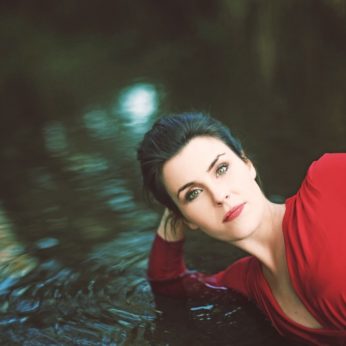Composer: Georg Frideric Handel (b. 1685 - d. 1759)
Performance date: 07/07/2019
Venue: St. Brendan’s Church
Composition Year: 1685 - 1759
Duration: 00:31:16
Recording Engineer: Ciaran Cullen, RTÉ
Instrumentation: S-solo, 2vn, va, vc, lu, hpd
Instrumentation Category:Baroque Ensemble
Artists:
Anna Devin -
[soprano]
Peter Spissky -
[violin]
Camerata Øresund (Ida Lorenzen [violin], Tinne Albrechtsen [violin], Alison Luthmers [vioin], Rastko Roknic [viola], Hanna Loftsdóttir [cello], Joakim Peterson [double bass], Dohyo Sol [lute], Magdalena Karolak [oboe], Marcus Mohlin [harpsicord]) -
[baroque ensemble]

Cardinal Benedetto Pamphili [1653-1730] was a leading figure in Roman
culture, composing operas and cantatas as well as providing libretti for such
composers as Scarlatti, Bononcini, and Melani.
He held high Vatican offices, including
librarian of the Biblioteca Apostolica Vaticana and archivist of the Archivio
Segreto Vaticano. He was also a generous patron of the arts and became a friend
of Handel during the composer’s Roman sojourn from 1706 to 1710 and they
maintained a lively correspondence in later years. He provided the texts for this Cantata and
for Handel’s first oratorio, Il trionfio del Tempo e del Disinganno,
both works were performed in early 1707 at one of the Cardinal’s palaces. This was the era when opera was banned in Rome and cantatas were
used to circumnavigate the papal law. The presence of dance movements in the
score suggests that some kind of staging may have been undertaken in private.
The score requires a chamber orchestra and virtuoso soloists: oboe, violin and
cello.
Arcadian and ancient
mythological themes were fashionable at the time and the Cardinal creates a
tale along the lines of the Orpheus legend but with a twist. The soloist
switches between narrator and the heroine Chloris herself. After a charming little overture in D major
featuring the oboe, the plot is explained in a recitative: Thyrsis has died and
his beloved Chloris is distraught. She enunciates her grief in a lively
coloratura aria Let my thought fly up to heaven with an exacting solo
violin part. In the ensuing recitative
she decides to go to Hades and rescue him. She thinks she sees his shade but it
vanishes and she appeals to him not to flee in a moving lament: I left the light for you. In the following recitative Chloris loses her
cool and accuses Thyrsis of mocking her; however, she then resolves to be kind
and will take him from Hades to the Elysian Fields. In her third aria she
commands a breeze to steer their ship there Abandon your dark sails. An orchestral interlude follows for which
Handel borrowed four lines of a piece by Reinhard Keiser, followed by music
from his own opera “Almira”. To conclude Chloris sings a charming minuet: Oh these delightful and serene shores . The narrator then returns to round off the
tale: perhaps all this had happened in Chloris’ mind. A short, sprightly
orchestral minuet closes proceedings.
Introduzione
Instrumental
Recitativo: Da
quell giorno fatale
|
Da quell |
Ever |
|
Che tolse |
When |
|
Il crudo |
Untamed |
|
Ella per |
In |
|
Sciolto il |
Her |
|
Incerto il |
Her |
|
In sé due |
Two |
|
E del chiaro |
And |
|
Per gran |
Disturbed |
|
Ora |
Now |
|
Fa |
Her |
|
E varia nel |
Her |
|
Agitate, |
Tormented, |
Aria: Un pensiero voli in ciel
|
Un pensiero |
Let |
|
Se in cielo |
If |
|
Alma bella |
Fair |
|
Che la pace |
Which |
|
Se in Averno |
If |
|
Per avermi |
For |
|
Io dal regno |
Then |
|
Il mio bene |
I |
Recitativo: Ma
fermata pensier
|
Ma fermata |
Stay, |
|
Pur troppo è |
That |
|
D’Averno è |
To |
|
Per giusta |
As |
|
Si, si, |
Yes, |
|
A rapir il |
To |
|
Dell’arsa |
From |
|
Alle |
From |
|
Ma che |
But |
|
Rimira il |
Gazing |
|
Dispettosa, |
Then |
|
Tirsi, ah |
Tirsi, |
Aria: Per te lasciai la luce
|
Per te |
For |
|
Ed or che mi |
And |
|
Amor per |
To |
|
Tu vuoi |
You |
|
Deh! Ferma I |
Ah, |
|
O pur se |
Or |
Recitativo: Non
ti bastava, ingrate
|
Non ti |
Was |
|
D’avermi in |
To |
|
Dopo |
After |
|
Siegui ad |
You |
|
Anzi, ti |
Indeed, |
|
Ch’io venga teco |
For |
|
Ma pietà per |
But |
|
Su, vieni al |
Come |
|
Indi daranno |
There |
|
Gli Elisi al |
To |
Aria: Lascia
omai le brune vele
|
Lascia omai |
Leave |
|
Negro pin di |
The |
|
Io farò che |
I |
|
Per diletto, |
Take |
|
Spiri |
In |
|
E che mova i |
To |
|
Pellegrini |
Towards |
Recitativo: Ma
siamo giunti in Lete
|
Ma siamo giunti |
But |
|
Odi il suono |
Hear |
Entrée
Instrumental
Minuet: In
queste amene
|
In queste |
On |
|
Piagge |
Tranquil |
|
Da sé ridente |
Every |
|
Nasce ogni |
Springs |
|
Tra suoni e |
Amid |
|
Sempre |
Lovers |
|
Spiran gli |
An |
|
Aura d’amor. |
Air |
Recitativo: Si,
disse Clori
|
Si, disse |
Yes, |
|
E se d’un |
And |
|
Più non vide |
Of |
|
Io vide |
She |
Minuet
Instrumental
Copyright © 2025 West Cork Music. All rights reserved.
Designed and developed by Matrix Internet